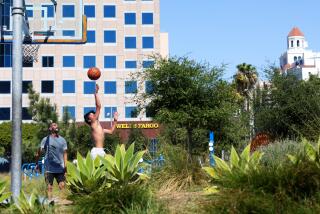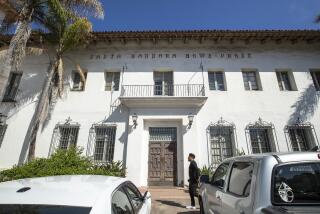Glimpse of an Elusive Tycoon
- Share via
SANTA BARBARA — She is one of the richest women in America, a preservationist-vegetarian-environmentalist-Libertarian who helped send “Willy” the captive whale back to his native Icelandic waters. Beyond that, Wendy P. McCaw pretty much thinks the facts of her life are none of your business, thank you.
Which is a tad ironic, since McCaw is the new media baroness of Santa Barbara, recently emerging from the exclusive woodwork of her Spanish-style home in the wealthy enclave of Hope Ranch as the buyer of the local daily, the 145-year-old Santa Barbara News-Press.
So few people in town have actually met her that Santa Barbara’s alternative paper, the Independent, ran a tongue-in-cheek piece wondering whether McCaw really exists.
“The fact is there are far more verified photographs of Sasquatch and the Loch Ness Monster than there are of Wendy P. McCaw,” a columnist wrote. The News-Press subsequently ran a letter from her to readers along with her photo, showing a slender, athletic-looking woman with long blond hair.
Despite this quick glimpse, she still remains about as elusive as Howard Hughes--a quality that doesn’t seem to bother residents. Maybe it’s the chauvinism of a community that believes it’s managed to hold on to paradise. Maybe it’s the simple deliciousness of reversing the corporate takeover of everything. But many residents seem delighted that a Santa Barbaran beat out hungry media chains to buy one of the town’s most influential voices from New York Times Co.
“I love it,” exclaimed software engineer Tom Gray, raising a fist in triumph as he paused on his way to a local drugstore.
Mused Mayor Harriet Miller, “It’s more of a reaction of ‘Oh, goody, oh, goody! We’re not going to have some company from the outside who doesn’t know us as opposed to someone who chose to live here.’ ”
During her marriage to cellular phone pioneer Craig McCaw, the couple lived in Seattle, his hometown. But for years they spent part of their time in Santa Barbara. And that’s where Wendy chose to settle after their 1997 divorce.
“Santa Barbara is a very special place,” said McCaw, 49, who declined to be photographed or personally interviewed but answered written questions submitted to her public relations firm. “It has a wonderful small-town charm, yet at the same time the sophistication of a larger city. There is a beauty and simplicity to the place.”
She outbid Disney chief Michael Eisner for her $9-million Santa Barbara estate on an ocean-side cliff, according to the Wall Street Journal. The Spanish showplace boasts stables, a long, tree-lined drive and enough acreage to keep McCaw well out of view.
She is expanding and restoring the 1930s-era buildings with such care that one person familiar with the work said contractors are using old-fashioned lath and plaster and 2-by-4s specially milled to match the archaic dimensions of the original framing.
Though she has not spread herself around town, she has spread her money around in ways much appreciated in these seaside hills, where environmentalism and historic preservation are rigidly observed commandments.
Her namesake foundation is funding education and research on improving ocean water quality by reducing stream pollution, has supported the return of the gray wolf to the West, worked to preserve gray whale breeding habitat and backed sustainable agriculture in Mexico’s Yaqui Valley.
Under another foundation project, inner-city youth grew and sold organic produce. And McCaw continues to support a cause on which she and her former husband spent several million dollars--returning Keiko, the 22-year-old orca whale and star of the film “Free Willy,” to the wild. He was flown from Oregon to Iceland in 1998, where he swims in enclosed ocean waters and trainers are trying to prepare him for freedom.
“This is the only world we have,” McCaw said. “And I think we should all do what we can to try to leave it in better shape than we found it.”
She has even said she will consider printing the News-Press on a more environmentally sensitive form of newsprint--prompting a columnist for the paper to joke that if rice paper is used, “no longer will you have to settle for having your paper with breakfast, you can have it for breakfast.”
The 45,300-circulation newspaper is generally regarded as a solid if somewhat thin local paper that fared reasonably well under the 15-year ownership of New York Times Co. In the last decade, some county bureaus have closed and circulation has dropped by a few thousand, but the paper has escaped the cut-to-the bone slashes imposed by some chains.
“It’s a little like being a sweepstakes winner,” said Publisher Allen Parsons, who described McCaw as articulate, poised and thoughtful.
With a fortune estimated at $1.5 billion by Forbes magazine, McCaw will probably not be obsessing too much over profit margins. In this day of bottom-line management combined with journalistic glitterati, she seems quaintly old-fashioned, at least as far as one can tell. She is investing new-technology millions in old media, has promised quality will come first and has no plans to become a power hostess a la celebrity editor Tina Brown.
“I don’t expect my role in the community to change very much,” said McCaw, who was just as protective of her privacy while married. She says she will help shape editorial opinions but will keep her nose out of the newsroom.
“I will not interfere with the news gathering process,” promised McCaw, a registered Libertarian. A subscriber to the News-Press, she says she never considered buying it, or any other publication, until one day last winter. That’s when the paper arrived at her expansive seaside estate with a front-page headline announcing it was for sale. She went to her downtown investment firm that morning and told the staff she was interested.
“We immediately got to work on it,” recalled McCaw, who, according to the News-Press, outbid Copley Newspapers, MediaNews Group and Howard Newspapers in the final round of negotiations.
That was not surprising. When McCaw pursues something, she tends to get it. After Craig McCaw, her Stanford sweetheart and husband of 22 years, decided he wanted a divorce in 1995, Wendy McCaw assembled a football team-sized group of lawyers and accountants to make sure she got her share of the more than $1 billion Craig made after selling his cellular phone empire to AT&T; Corp.
The divorce settlement was--of course--confidential and the court filings were devoted to voluminous financial, rather than personal, information. But securities documents revealed that Wendy McCaw received nearly half a billion dollars in Nextel and Nextlink communications stocks. After a jump in its value, she was ranked 159th on Forbes’ 1999 list of America’s richest individuals.
In 1998, she founded Ampersand Holdings and runs it out of a downtown building she restored. The company, which has a staff of 10, invests in and manages ventures in a variety of fields including telecommunications, environmental technology and commercial and historic real estate.
It is through Ampersand that McCaw is buying the News-Press and its downtown building, a 76-year-old architectural landmark a stone’s throw from City Hall. Terms of the deal were not disclosed, but analysts say the paper would fetch at least $90 million.
The News-Press makes money, if not at the rate demanded by the most profit-oriented chains.
“She is rich enough to withstand at least some of the pressures toward bottom-line journalism that have eroded so many local newspapers around the country as they have been taken over by a few chains,” observed UC Santa Barbara communications professor Steven Chaffee.
“I expect the News-Press to be successful from a business standpoint, like all of my investments,” McCaw said. “However, quality will not be sacrificed for the sake of margins.”
McCaw also wins points for hiring respected locals to work in key positions at her foundation and her investment firm.
“She surrounds herself with extremely capable people, which is a very good sign,” said Marshall Rose, executive director of the Downtown Organization.
Her employees must be discreet as well as capable. One of the first things that comes up in job interviews is the fact that they can’t blab about their work or about her.
“I don’t hate publicity, but I do value my privacy,” said McCaw, who wouldn’t answer any personal questions.
She’s in the right place to get it. Said City Councilwoman Marty Blum, “We’re pretty good in Santa Barbara about leaving people alone when they’re famous and they move here.”
More to Read
Sign up for Essential California
The most important California stories and recommendations in your inbox every morning.
You may occasionally receive promotional content from the Los Angeles Times.











